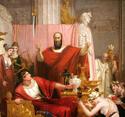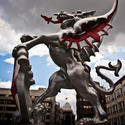When the cardinals sent billowing white smoke from their conclave and elected Jorge Mario Bergoglio as Pope Francis I, little did the Catholic Church realize that two millennia of ecumenical liturgy might come unraveled on the heresy of offshore banking regulations. Among the many frustrations that drove Pope Benedict XVI to take early retirement was his role as guardian angel of the Institute for the Works of Religion (the formal title for the Vatican Bank), which can no longer get past compliance questions by answering that its beneficial owner is “the Almighty.” read more »
Financial Crisis
The Vatican Bank: In God We Trust?
- Login to post comments
CEO Bonuses: Who Pays the Price?
Because so many chief executives of failed or mediocre companies have walked away with millions in bonuses and swag bags, both Switzerland and the European Union recently voted to put a cap on corporate bonuses, limiting them to a small multiple of base salary. What prompted the acceptance of the “Minder Initiative”—named after the independent parliamentarian who sponsored the referendum — is a string of stunning business losses that had no affect on the bonuses paid to the sitting executives. read more »
The Age of Bernanke
To many presidential idolaters, this era will be known as the Age of Obama. But, in reality, we live in what may best be called the Age of Bernanke. Essentially, Obamaism increasingly serves as a front for the big-money interests who benefit from the Federal Reserve's largesse and interest rate policies; progressive rhetoric serves as the beard for royalist results. read more »
The Swaps of Damocles
"Privileged people don't march and protest; their world is safe and clean and governed by laws designed to keep them happy...." Michael Brock in John Grisham's The Street Lawyer (Doubleday, 1998).
"There can be nothing happy for the person over whom some fear always looms…” Cicero, Tusculan Disputations 5.62, via Wikipedia.com read more »
How California Lost its Mojo
The preferred story for California's economy runs like this:
In the beginning there was prosperity. It started with gold. Then, agriculture thrived in California's climate. Movies and entertainment came along in the early 20th Century. In the 1930s there was migration from the Dust Bowl. California became an industrial powerhouse in World War II. Defense, aerospace, the world's best higher education system, theme parks, entertainment, and tech combined to drive California's post-war expansion. read more »
Libor: Is The City of London Fixed?
Having worked inside banking, do I think that banks colluded to post an artificial London interbank offered rate, otherwise known as Libor? For those not in the brotherhood, that acronym is a compendium of average borrowing prices from sixteen large banks, pronounced either as lee-boar or lie-bore. Before turning to conspiracy theories, let’s review the facts of a scandal that began more than four years ago, and are so murky that I, for one — despite twenty-five years in international banking — have a hard time grasping. read more »
- Login to post comments
Enjoying the Kool-Aid in Omaha
I left Santa Monica for Omaha less than 3 months before the collapse of the global financial infrastructure in September 2008. The impending problems in housing and credit markets – obvious from early 2007 and exacerbated by the pile-on effect of derivatives gone wild – were increasingly in the bank of my mind. I made the decision to leave the dense urban population center of southern California and head to a place where —as recently described in an episode of The Walking Dead – there is a small population and lots of guns. I figured if the world was going to fall apart (something short of being over-run by zombies but worse than a minor recession) I’d rather not be sitting with my back to the ocean and no boat. read more »
Commanding Bureaucracies & 'The New Normal'
Prior to the fifteenth century, China led the world in technological sophistication. Then, it went into a period of long decline. Here’s what Gregory Clark had to say about it in Farewell to Alms:
... When Marco Polo visited China in the 1290s he found that the Chinese were far ahead of the Europeans in technical prowess. Their oceangoing junks, for example, were larger and stronger than European ships. In them the Chinese sailed as far as Africa. read more »
- Login to post comments
The Next Public Debt Crisis Has Arrived
In July of 2009, while the smoke from the global financial bonfire was still thick in the air, I wrote for this website about another crisis of massive proportions just looming on the horizon: the Global Crisis in Public Debt. read more »
This Is America's Moment, If Washington Doesn't Blow It
The vast majority of Americans believe the country is heading in the wrong direction, and, according to a 2011 Pew Survey, close to a majority feel that China has already surpassed the U.S. as an economic power.
These views echo those of the punditry, right and left, who see the U.S. on the road to inevitable decline. Yet the reality is quite different. A confluence of largely unnoticed economic, demographic and political trends has put the U.S. in a far more favorable position than its rivals. Rather than the end of preeminence, America may well be entering a renaissance. read more »
- Login to post comments





















